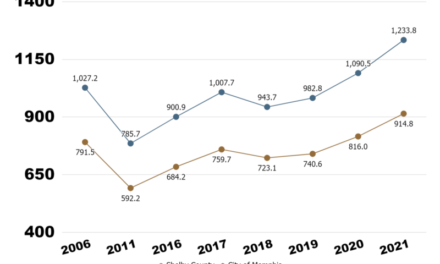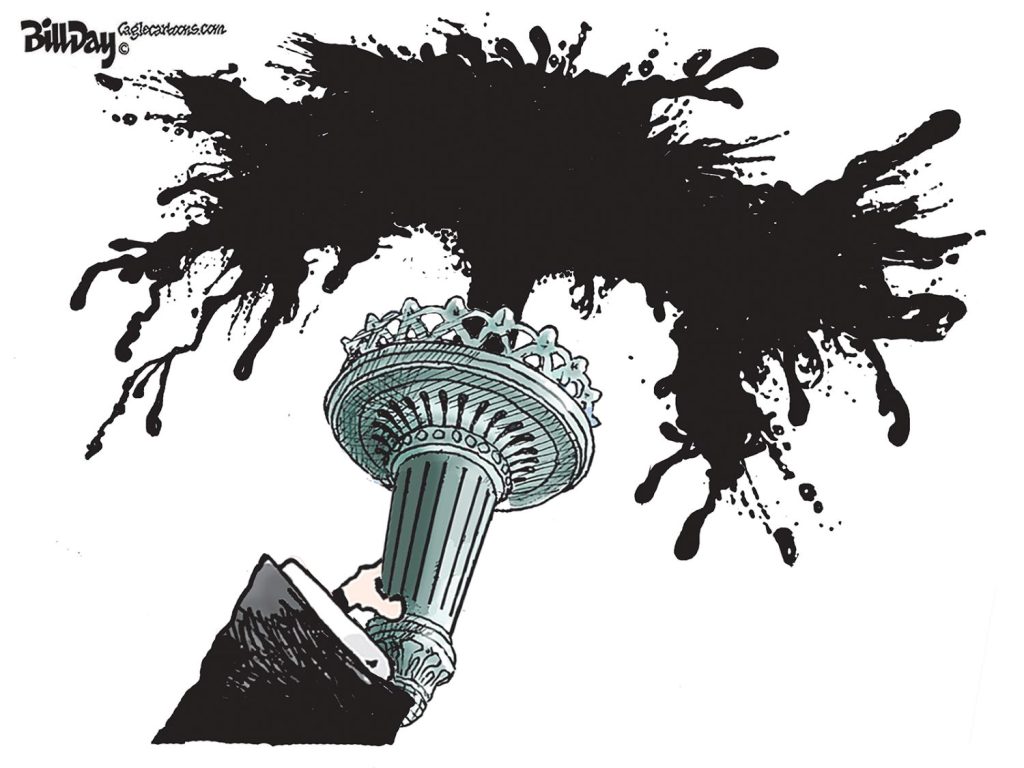It’s been a tough few days for the ‘burbs.
Shelby County Commissioner Mike Ritz released his analysis of the municipal schools’ costs and the taxes needed to fund them, and Memphis City Councilman Edmund Ford Jr. proposal for non-Memphians to pay for vehicle inspections summoned up a case of amnesia for long-time suburbanites.
So far, the suburban forces leading the charge for their separate but equal schools have taken a “slash and burn” attitude toward anyone who challenges them with the facts, so it’s no surprise that they came out with guns blazing at Commissioner Ritz’s conclusion that the consultants paid by the towns low-balled the size of the tax hike that will be needed there to pay for schools.
It’s worth remembering that Mr. Ritz is the first director of the Memphis and Shelby County Office of Planning and Development, a consultant on planning and economic development, and a banking executive. He is also chairman of the budget committee for the Shelby County Board of Commissioners.
Mr. Ritz’s seven-page report makes for captivating reading, although Arlington Mayor Mike Wissman said the commissioner was “clouding the issue” and raising fears and doubts among voters. That’s a classic case of projection: from the beginning, there’s been an abiding fear in gathering all the facts and information that would allow voters to make an informed choice at the polls.
Leveling the Playing Field
Commissioner Ritz inventoried his financial assumptions and concluded that Bartlett will need a tax increase of $1.36 to pay for schools; $1.06 in Germantown; 84 cents in Collierville; $3.91 in Arlington; $1.28 in Millington, and 34 cents in Lakeland. It’s always been our thinking here that the property tax increase would be in the $1 range for the larger cities.
In other words, Mr. Ritz’s projects that the tax rates in the towns, as a result of municipal schools, will be:
- $2.85 – Bartlett
- $2.27 – Collierville
- $2.55 – Germantown
- $4.91 – Arlington
- $0.34 – Lakeland
- $2.51 – Millington
The City of Memphis property tax rate, based on Memphis Mayor A C Wharton’s pledge that the tax increase to pay the court-ordered funding for Memphis City Schools is for one year only, will be $3.19.
We have suggested for seven years on this blog that all regional services should be shifted to the regional – Shelby County – tax base to equalize the tax rates between Memphis and its suburbs. It seems that things are about to dramatically move in that direction.
Be Careful What You Wish For
Back in January, Germantown Mayor Sharon Goldsworthy said she was looking for “hopefully a very rational, reasonable group of people figuring out how to do this and hopefully they would be receptive to all sorts of creative ideas about how schools might advance in Shelby County.” But then again, she was talking about the unified school transition planning committee. That same reasonableness never seemed to be applied to the suburban school advocates themselves, as the towns rushed headlong toward a future of municipal districts with a lot of talk about excellent schools but without a real plan that emphasizes academics as much as politics.
Collierville Mayor Stan Joyner said that his town is working to “get education right” although there’s no consultants’ study about academic performance, teacher excellence, classroom size, and other issues affecting school success in the town districts. Unfortunately, the town school issue has turned into a political campaign in the towns where the emphasis is on getting out the vote instead of getting out all the information and creating an informed electorate.
Mayor Wissman harbors the delusion that the towns should be given the school buildings in their borders free and clear. It makes no sense. More reasonably, for example, the cost that Arlington should pay for a school should be discounted only by the percentage of the total county taxes paid by the town. The total cost minus that percentage is what Arlington should pay.
But under the heading of “be careful what you wish for,” the county towns are about to learn what it’s like to pay their own way after a history of being subsidized by county government. After decades of justifications for why Memphians should pay twice for schools, town taxpayers are about to find out what that feels like.
Back to the Future
Then, there is Councilman Ford’s proposal. His “back to the future” idea is a logical way for everyone driving inside Memphis to address the Memphis area’s history of noncompliance on ozone emission standards.
About 15 years ago, officials with the Health Department wanted to order countywide inspection of vehicles to deal with the ozone issues, but every time, county politics reared its head. As a result, the mayor’s office refused to allow the Health Department recommendations to become policy. It’s too bad, because everyone in the region should “own” the solutions for our air quality problems rather than acting like someone the problem stops magically at the city limits.
Last year, Councilman Ford proposed a $7 inspection fee for non-Memphians, and it’s an idea whose time has come. As Councilman Ford said: “There are more cars outside Memphis than inside Memphis polluting our air and Memphians are paying the burden exclusively.”
We’re not sure this really meets the definition of news, but the town mayors were critical of Mr. Ford’s proposal. Mayor Wissman, also a Memphis firefighter (but you’d never know it by his anti-Memphis rants) opposed the fees but maybe he would rather that the costs of air quality should be paid by reducing the budget of Memphis Fire Department. In addition, Bartlett Mayor Keith McDonald showed a lack of understanding about air quality issues, and Mayor Joyner offered up his own justification for why Councilman Ford is off track.
Actually, back when Mr. Joyner was in high school in Collierville, non-Memphians were required to get their cars inspected at the Memphis vehicle inspection station if they drove inside the city more than three times a year. Back in the days when Collierville’s population was 1,500, it was a rite of passage for every teenager in the household to drive the family car into Memphis for inspection.
That was even before the air quality issues that have plagued the Memphis region for the past 15 years or so. The best answer would be for the Health Department to order countywide inspections, but absent that, Councilman Ford is on the right track.






The inspection fee is a good idea, but nearly impossible to enforce. How would one ascertain how many times a car goes into the city?
SCM, Please;
Ritz did not “challenge the burbs with the facts.” He made three very broad assumptions and translated those assumptions into mathematical equations in order to give them legitimacy. He has a spreadsheet masquerading as a study.
He ASSUMED that no one could operate a school district on a lower per pupil funding level than SCS and then further assumed that even that number was 10% too low. The fact is that well over half of the school districts in TN operate on lower per pupil funding levels than SCS. He also ASSUMED that the burbs would pay big bucks for school buildings.
You accuse us of ‘projecting’ and then demonstrate that very behavior yourself. You prefer Ritz’s numbers to those of the consultant so you accept them without critical thought.
Ritz raises a couple of good questions: How much will the muni districts spend on retiree health benefits? How much will it cost to level up the teacher salaries. He makes no attempt to answer either of these questions.
Here are some facts: SCS budgets right at $5 million for retiree health. The muni boards will set their own retiree health policy, so they will control their own costs. IF an 8,000 student muni matched the SCS program, their cost would be around $800,000. The TPC calculated a per teacher cost of $285 to level up salaries. The Germantown muni projects 400 teachers for a potential level up cost of $120,000. So – the likely answer to Ritz’s questions is “less than the budget surplus projected in the consultant’s study.”
Conclusion – We may find that we have another million or two in spending as we translate the study into an actual school district. IF the county does not increase education funding, Germantown might choose to contribute another million dollars to education – an additional $52 per year for the average Germantown homeowner. Ritz’s conclusion that we may need another $1.06 in property taxes is off by 1500%.
We know that the buildings are an unresolved question. That’s not new news.
The only people who think the burbs are not adequately informed on the question are the folks who want to see a NO vote.
If we’re looking for unjustifiable consultants’ opinions, we should look to the report written by the town’s consultants. Either it’s a campaign document lowballing the cost of the districts for political purposes or someone involved is looking to be superintendent. We read both reports and based on what we know about the law and budgets, we think Ritz’s is much closer to what reality will be.
We’ll make a bet with you today that within four years, the taxes for the town schools will be closer to $1 than 15 Cents.
Why are you guys so intent on the bum’s rush on this and so focused on winning an election than sorting all the facts and giving your voters the opportunity to make a fully informed decision?
What’s the harm in taking the time that’s needed to make such expensive, monumental decisions? That said, Memphis taxpayers really don’t care that much since you are on the verge of equalizing tax rates and paying more of your share for public education generally and for the schools you’ve bragged so much about for so many years but didn’t value enough to put in one dollar of property tax from the towns. The towns are getting closer and closer to having to stand on their own instead of being subsidized by Shelby County Government and ultimately Memphians.
“Based on what you know”, you should be able to point out the budget items where the consultant’s are way off. Many agree that the costs are understated, but no one seems to know where. Ritz offered a couple of ideas, but no numbers to go with those ideas.
Another part of your logic really confuses me. You say that the lowball numbers are either a bait and switch or are Mitchell angling to be Superintendent. I can’t follow how Mitchell would want to step in as Superintendent knowing he would be forced to admit that he completely messed up the cost estimate. Seems to me if he wanted to be super, he would be very careful to make sure he could run the district at the cost he advertised. As for the Mayor; why would she want to pass a referendum on a $0.15 promise if she knew the real cost was going to be much higher? How does she benefit politically from tricking her residents into voting for a school district they are not willing to pay for?
We have been studying this idea for 16 months. How long must we study before you no longer consider this a rush job?
“As for the Mayor; why would she want to pass a referendum on a $0.15 promise if she knew the real cost was going to be much higher? ”
Are you serious?
Anonymous 11:25: We haven’t seen any serious studying of the issue. We’ve seen talking points, a political campaign, and reports driven to the predetermined conclusion. We have not seen anyone studying ALL of the options. As for why anyone lowballs numbers, they do it because later on, no one will hold them accountable. At that point, they can blame it all on the county government and those awful Memphians.
A University of California law professor concludes that a 2011 state law “made things dramatically worse for Shelby County, including Memphis,” by favoring the “strongest suburbs” over the Shelby County metro area as a whole.
Richard Locker did a write-up on the article about the measure, which came after Memphis City Schools moved to dissolve and become part of the Shelby County system.
The Columbia Law Review article by UC Berkeley Law School assistant professor Michelle Wilde Anderson examined the Memphis City Schools district’s “dissolution” and the state’s response to it — the “Norris-Todd Act” of 2011 — in the context of its larger effects on regionalism.
Anderson was most critical of the state’s response when the merger issue arose in early 2011. “The state has a critical role to play in determining whether the (Memphis City Schools) dissolution is an opportunity or a setback for Shelby County.”
In its response to “a struggling district that opts for dissolution, the state could have and should have made the county as strong and competent as possible so as to stabilize the service provided in the dissolving district without hurting county children.”
“Instead, Norris-Todd hobbles the combined district, favoring the strongest area suburbs over metropolitan Memphis as a whole. By permitting the breakaway school districts within Shelby County, the state has created the high probability that the best-resourced subterritories within the former Shelby County Schools district will break away into new districts,” Anderson wrote.
“The breakaway provisions of Norris-Todd are poised to … weaken the county schools at their time of greatest vulnerability. Much power now lies with Shelby County’s wealthiest suburbs. Will they contribute to helping the new regional Shelby County Schools succeed, or will they secede?”
She got a C- on her term paper when she submitted it, I heard.
Anon- to what term paper are you referring? I saw no mention of the article as a “term paper”. Furthermore, the Columbia Law Review is a highly respected publication which is hardly known for publishing articles of poor quality. It appears that instead of debating the points made in the article (assuming you actually read it or could understand the subject material), you are instead attempting to circulate rumors about the article and its author. I seriously doubt you “heard” any such thing.
As for the author, a quick check of her background shows she is more than qualified to comment on this evolving disaster of a school system. Let’s see: received her B.A. from Yale in ’97, earned her master’s degree in Regional and Urban Planning at the London School of Economics and Political Science in 2000 and most recently graduated from UC Berkley Law in 2004 where she was also awarded the Thelen, Marrin Prize for Law Journal Writing and served as the Senior Articles Editor of the California Law Review. This has allowed her to fine tune her focus of research towards county governments and their subdivisions, including the governance of high poverty, unincorporated urban neighborhoods and the dissolution of struggling municipalities.
If any “published” article or comment deserves a grade of less than mediocre merit it would be your own.
Urban,
Here’s my critique of her article:
1) She accepts the M. Jones false rationale for dissolution – “the timing also represented a preemptive strike against proposals that would turn Shelby County Schools into its own special school district, thereby reducing county funding to the city schools” To her credit, she concludes part 1 by acknowledging that the underlying goal was to get Memphis off the $78M hook for funding schools.
2) She does not seem to understand the school financing formula in Shelby County and erroneously concludes that municipal districts will deprive the unified county system of resources – “so too does it hurt counties when their richest property tax base can escape into incorporated status and leave the county with leftover pockets of rural and suburban poverty.” The burbs may not be part of the unified district, but they won’t escape the tax man.
3) I find it an interesting twist of logic to call staying put ‘flight’. – “And by permitting new cities or school districts to form within Shelby County, the Norris-Todd Act added a new and even more potent lever for white flight—one that would not require either paying private tuition or moving one’s family.” The professor gives no thought to the possibility that real flight might occur without the muni districts. Is it not possible that the muni districts will make the whole of Shelby County stronger, not weaker? The contra-view to Wilde would be section b(3) will ultimately prevent significant green flight from Shelby County.
4) She treats the City of Memphis and the County of Shelby as two very distinct entities, bemoaning the fact that the “County” did not embrace the challenge of fixing Memphis City Schools. Shelby County and Memphis City are effectively one and the same from a policy standpoint. She apparently didn’t read the articles where Memphians howled about the 50/50 city/suburb split on the TPC. It seems a stretch to conclude that adding 2 suburban seats to the MCS board would make a big difference in the operation of that district. MCS and the City of Memphis have never looked to the suburbs for any assistance in operating their schools other than access to the tax base. Formation of munis won’t diminish the access MCS has to the suburban tax base.
5) She criticizes the State for not strengthening the County’s ability to stabilize this school district. She completely ignores the TPC, a creature of Norris-Todd. This group is doing outstanding work and they have a real prospect of improving the city schools – the best shot we have seen in my 22 years here. Give credit where credit is due; without Norris-Todd, the court fight over who’s in charge and when would have been much, much nastier.
6) She champions educational equity without describing what that means. No one has suggested that unification will raise test scores at Woodale to Collierville levels. You must assume that the muni districts will be better school operators than the unified district in order to conclude that muni districts will make any difference in equity of outcomes.
My conclusion (not surprisingly) is the opposite of Ms. Wilde’s. Rather than hobble Shelby County, Norris-Todd gave the city schools the greatest possible chance at improvement and the county as a whole the best chance to thrive with the educational choices that will result from mulitple school districts.
Ken- I respect your opinions, and I do appreciate that at least someone has in fact actually read the article before posting comments. I disagree with several of your points including those which require assumptions regarding reasoning and the underlying motivations of the various parties involved. Also, you might want to stop referring to the emerging district as the MCS in the future. There will be no MCS regardless of the outcome of the merger process.
While I would love to debate your points, I humbly request a pardon so as to avoid the never ending, vomitous nature of the bickering found on other sites where this issue has been raised.
speaking of california college classes-wonder if she protested the fee increases at Berkeley?